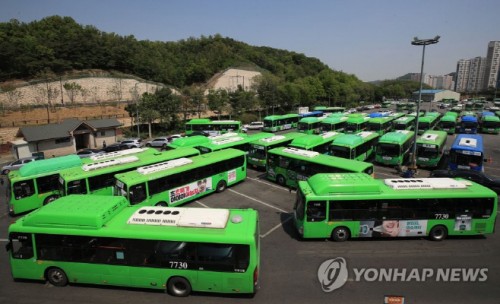 |
| Bus drivers from 11 cities and provinces across the country are set to stage a general strike on Wednesday./ Source: Yonhap |
By AsiaToday reporters Jang Min-seo & Kim Beom-joo & Jo Joon-hyuk
As bus drivers from 11 cities and provinces across the country are set to stage a general strike on Wednesday, Deputy Prime Minister and Finance Minister Hong Nam-ki held talks Monday with Korean Automobile and Transport Workers’ Federation President Ryu Keun-joong and Federation of Korean Trade Unions President Joo-young behind closed doors at the central government complex in Seoul.
During the talks, Hong said he will actively review the role of the central government in strengthening the publicness of the bus. However, he stressed the role of local governments as the central government transferred its duties regarding financial support for buses to local ones.
“The prime minister has said that the central government will look into its role to strengthen the publicness of city buses,” said Ryu after the talks. “He said it’s time to consider raising bus fares regardless of this issue,” he added.
Currently, 11 bus unions from 11 cities and provinces, including Seoul, have decided to set a simultaneous general strike on Wednesday. The unions are demanding to preserve wages, which can be reduced when the 52-hour workweek system is applied to them starting in July. The city bus union is currently demanding a 5.9% wage increase as well as extension of retirement age and welfare fund.
In response, Seoul Metropolitan Government said in a regular general briefing Monday that it would do its best to prevent city buses from stopping their services.
“We will make it possible for the companies and the unions to reach an agreement smoothly at the second round talks of Seoul National Labor Relations Commission on Tuesday,” Kim Eui-seung, a spokesman for Seoul Metropolitan Government, said. “Despite these efforts, we are preparing to take emergency measures, such as increasing the number of subways and extending service time in preparation for a strike.”
“Seoul City has been preparing to implement the 52-hour workweek system since last year by hiring 300 extra drivers and bringing the average working hours to 47.5 a week,” the spokesman said. The Seoul Metropolitan Government said it had no plans to allow a fare hike, saying it took preliminary measures. “The semi-public system and the 52-hour workweek system, the agendas of the nationwide bus strike, have been prepared ahead of other local governments. The working conditions and treatment of workers are said to be the best in the country,” the spokesman said.
Meanwhile, citizens urged the government to address the issue as bus drivers are set to stage a general strike on Wednesday if the unions and bus companies fail to reach an agreement.
“Although the bus strike is an old problem, the parties concerned (the central government, local governments, unions, and bus companies) dragged their feet on this issue, triggering a bus crisis,” said Lee, a 41 year-old citizen engaged in the financial sector. “The government turned up a bus fare increase card, but it is saying it cannot force the bus companies. I think the government has no willingness to solve the issue.”
Some citizens criticized the bus unions’ strike. “I disagree with the fact that public service operators are staging a strike,” said Yi, a 38 year-old office worker. “People turned their backs on a strike by the Korea Kindergarten Association. In order to acquire more support from ordinary citizens, it needs to find an alternative instead of a strike,” she said.
#bus strike #union #52-hour workweek system #Hong Nam-ki
Copyright by Asiatoday
Most Read
-
1
-
2
-
3
-
4
-
5
-
6
-
7





















